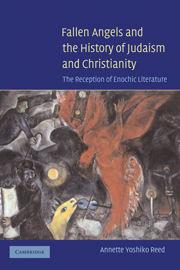Book contents
- Frontmatter
- Contents
- Preface
- List of Abbreviations
- Fallen Angels and the History of Judaism and Christianity
- Introduction
- 1 Angelic Descent and Apocalyptic Epistemology: The Teachings of Enoch and the Fallen Angels in the Book of the Watchers
- 2 From Scribalism to Sectarianism: The Angelic Descent Myth and the Social Settings of Enochic Pseudepigraphy
- 3 Primeval History and the Problem of Evil: Genesis, the Book of the Watchers, and the Fallen Angels in Pre-Rabbinic Judaism
- 4 The Parting of the Ways? Enoch and the Fallen Angels in Rabbinic Judaism and Early Christianity
- 5 Demonology and the Construction of Christian Identity: Approaches to Illicit Angelic Instruction among Proto-Orthodox Christians
- 6 The Interpenetration of Jewish and Christian Traditions: The Exegesis of Genesis and the Marginalization of Enochic Literature
- 7 The Apocalyptic Roots of Merkabah Mysticism? The Reemergence of Enochic Traditions in Rabbinic Judaism
- Epilogue
- Bibliography
- Index of Modern Authors
- Index of Primary Sources
- Subject Index
4 - The Parting of the Ways? Enoch and the Fallen Angels in Rabbinic Judaism and Early Christianity
Published online by Cambridge University Press: 17 August 2009
- Frontmatter
- Contents
- Preface
- List of Abbreviations
- Fallen Angels and the History of Judaism and Christianity
- Introduction
- 1 Angelic Descent and Apocalyptic Epistemology: The Teachings of Enoch and the Fallen Angels in the Book of the Watchers
- 2 From Scribalism to Sectarianism: The Angelic Descent Myth and the Social Settings of Enochic Pseudepigraphy
- 3 Primeval History and the Problem of Evil: Genesis, the Book of the Watchers, and the Fallen Angels in Pre-Rabbinic Judaism
- 4 The Parting of the Ways? Enoch and the Fallen Angels in Rabbinic Judaism and Early Christianity
- 5 Demonology and the Construction of Christian Identity: Approaches to Illicit Angelic Instruction among Proto-Orthodox Christians
- 6 The Interpenetration of Jewish and Christian Traditions: The Exegesis of Genesis and the Marginalization of Enochic Literature
- 7 The Apocalyptic Roots of Merkabah Mysticism? The Reemergence of Enochic Traditions in Rabbinic Judaism
- Epilogue
- Bibliography
- Index of Modern Authors
- Index of Primary Sources
- Subject Index
Summary
ABOVE, WE CONSIDERED TEXTS FROM THE FIRST AND EARLY SECOND century ce as part of our evidence for pre-Rabbinic Judaism, without distinguishing between authors who did and did not believe that Jesus was the messiah. This reflects the character of our evidence. References to the fallen angels in Second Temple Judaism and the NT literature follow the same basic pattern: early Enochic traditions about the Watchers' sexual sins and their punishment were widespread, but even texts that were clearly dependent on the Book of the Watchers consistently omitted reference to their transmission of corrupting teachings to humankind. The only exceptions that we found were two texts closely aligned with the Book of the Watchers: Jubilees and the Similitudes. By contrast, the relevant Christian sources all followed the majority of Jewish sources in their exegesis of Gen 6:1–4 and their use of this apocalypse.
This finding fits well with what we know about the Jewish origins of the Jesus Movement and early Christianity. In the century after the death of Jesus, this messianic movement became gradually displaced from its original Galilean and Jerusalemite contexts, but the beliefs and practices of the earliest Christians (whether ethnic Jews or Gentile converts) continued to be shaped by the diverse forms of Judaism that flourished both in Israel and in the Diaspora. In the NT and early Patristic literature, we can discern the first traces of a long process by which some Christians forged systems of belief and practice that distinguished them first from other Jewish groups and progressively from “Judaism” more broadly.
- Type
- Chapter
- Information
- Fallen Angels and the History of Judaism and ChristianityThe Reception of Enochic Literature, pp. 122 - 159Publisher: Cambridge University PressPrint publication year: 2005



